#Xamarin App Development React Native Mobile App Development
Explore tagged Tumblr posts
Text
Unlock Mobile Success with Xamarin, React Native, and Ionic App Development Services by Hidden Brains
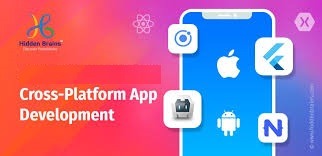
In today’s fast-paced digital world, businesses are constantly looking for efficient ways to develop high-quality, cross-platform mobile apps that resonate with users. Hidden Brains, a leading Xamarin mobile app development company in India, offers robust solutions tailored to business needs. With services spanning across frameworks like Xamarin, React Native, and Ionic, Hidden Brains provides dedicated developers to help transform your app ideas into reality.
Why Choose Hidden Brains for Cross-Platform Mobile App Development?
Choosing the right technology stack is crucial for app success. With Hidden Brains, you get access to expert developers who excel in building reliable and scalable mobile applications. Whether you’re looking to hire Xamarin developers in India, hire dedicated React Native developers, or hire Ionic app developers in India, Hidden Brains has got you covered.
Benefits of Cross-Platform App Development with Hidden Brains
Cost-Effective SolutionsDeveloping apps for multiple platforms can be expensive. Hidden Brains utilizes cross-platform frameworks like Xamarin, React Native, and Ionic to deliver cost-effective solutions, ensuring your app performs seamlessly across devices.
Faster Time-to-MarketIn a competitive market, timing is everything. By choosing Hidden Brains, a trusted React Native app development company in India, you get a faster time-to-market. Our developers use single codebases across platforms to expedite the development process.
Access to Skilled DevelopersHidden Brains provides a pool of talented developers who understand the nuances of each platform. When you hire dedicated React Native developers or hire Ionic app developers in India, you are guaranteed expertise and quality.
Xamarin Mobile App Development for Versatility
Xamarin is a popular choice for businesses that want native-like performance in a cross-platform application. As a premier Xamarin mobile app development company in India, Hidden Brains delivers secure, high-performance apps that enhance user experience.
Native User Experience: Xamarin allows near-native performance, making it ideal for apps requiring high-quality visuals.
Shared Codebase: The framework uses C# and .NET, reducing development time and enabling updates with ease.
Seamless Integration: Xamarin apps can integrate smoothly with various APIs, making them suitable for enterprise-level applications.
Hire Xamarin Developers in India: Why It’s the Right Choice
When you hire Xamarin developers in India through Hidden Brains, you access expert developers skilled in this versatile framework. Here’s why you should consider Xamarin for your next project:
Reduced Cost: Xamarin uses a single codebase, saving development costs.
Faster Development: Speed up your launch with Xamarin's streamlined approach.
Quality Assurance: Hidden Brains ensures that Xamarin apps are thoroughly tested for bugs and performance.
React Native App Development: Perfect for High-Performance Apps
React Native is a popular choice for companies aiming to build dynamic and high-performance applications. Hidden Brains, a reliable React Native app development company in India, provides robust solutions that guarantee user satisfaction and engagement.
Reusable Code: React Native allows code to be reused across platforms, reducing time and costs.
Third-Party Integrations: Enhance app functionality with plugins and APIs.
Efficient Updates: React Native’s “hot reloading” feature allows developers to make updates instantly, improving the development experience.
Hire Dedicated React Native Developers for Custom Solutions
When you hire dedicated React Native developers from Hidden Brains, you get experts focused on delivering customized solutions that align with your business goals.
Tailored to Your Needs: Our React Native developers adapt to your business needs, providing custom features and functionalities.
Timely Delivery: With dedicated resources, you get quicker turnaround times.
Seamless Communication: Our dedicated developers work closely with you, ensuring that your vision is at the forefront of development.
Ionic App Development for Lightweight, Web-Based Solutions
Ionic is ideal for building lightweight, high-performance mobile apps. Hidden Brains is a leading Ionic app development company in India, providing cost-effective and efficient solutions.
Browser-Based Development: Ionic uses web technologies like HTML, CSS, and JavaScript, making it suitable for web-based mobile apps.
Smooth UI/UX: Ionic’s pre-built components and themes streamline the UI/UX design process.
High Performance: Ionic’s integration with Cordova and Capacitor enables access to native device features, boosting app functionality.
Hire Ionic App Developers in India for Cost-Effective Solutions
Looking to build an app on a budget? When you hire Ionic app developers in India through Hidden Brains, you can achieve powerful results without breaking the bank.
Efficient Development: Our Ionic developers leverage Ionic’s modular components, reducing development time and costs.
User-Centric Design: Ionic enables a sleek user experience that resonates with your target audience.
Cross-Platform Compatibility: Ionic apps work seamlessly across multiple devices, giving you a wider reach.
Why Hire from Hidden Brains?
Choosing Hidden Brains means partnering with a team committed to delivering outstanding mobile solutions. Here’s what makes Hidden Brains the preferred choice:
Proven ExpertiseWith a track record of successful projects, Hidden Brains brings expertise to each project, ensuring high-quality results.
Transparency and CommunicationWe keep you informed at every stage of the project, allowing seamless collaboration and transparency.
Scalable SolutionsOur solutions are designed to grow with your business. Whether it’s a small-scale project or a large enterprise app, we adapt to meet your evolving needs.
Conclusion
Whether you’re looking to hire Xamarin developers in India, hire dedicated React Native developers, or hire Ionic app developers in India, Hidden Brains offers the expertise, cost-efficiency, and quality needed to make your project successful. Our services help businesses achieve their goals by delivering high-performing, cross-platform applications that resonate with users. Unlock your mobile app’s potential with Hidden Brains and stay ahead in the competitive digital landscape.
#xamarin mobile app development company india#hire xamarin developers in india#react native app development company india#hire dedicated react native developer#hire ionic app developer india
0 notes
Text
Leading Mobile App Development Services for Android, iOS, and Cross-Platform Solutions
In today's digital landscape, having a robust mobile app is essential for any business looking to expand its reach and engage with customers effectively. At Qono Tech, we specialize in delivering top-tier mobile app development services across various platforms, ensuring your app is functional, user-friendly, and scalable.
Android App Development
Android remains one of the most widely used operating systems globally, making it critical for businesses to have a strong presence on this platform. Our expert developers at Qono Tech leverage the latest Android SDKs, tools, and technologies to create apps that offer seamless performance, excellent user experience, and strong security.
iOS App Development
Targeting the premium market? Our iOS app development services ensure your app meets the high standards set by Apple. We build iOS applications with an emphasis on intuitive design, secure architecture, and high performance, ensuring your app stands out in the Apple ecosystem.
Flutter App Development
For businesses looking for a single codebase solution that works across platforms, Flutter is an excellent choice. We use Flutter’s rich widget library to craft visually stunning apps that perform smoothly on both Android and iOS, significantly reducing development time and cost.
React Native Development
React Native is another powerful framework for cross-platform development, known for its ability to reuse code across different platforms. Our React Native developers create apps that not only save time and resources but also deliver near-native performance and functionality, making it a popular choice for businesses of all sizes.
Cross-Platform App Development
Cross-platform development is ideal for businesses aiming to reach a wider audience without developing separate apps for each platform. At Qono Tech, we utilize frameworks like Xamarin and React Native to create high-quality cross-platform apps that offer a consistent user experience across Android, iOS, and even web platforms.
Xamarin App Development
Owned by Microsoft, Xamarin allows for extensive code sharing across platforms, making it a cost-effective solution for businesses. Our team at Qono Tech uses Xamarin to develop apps that feel truly native, leveraging its ability to access platform-specific APIs and features.
Why Choose Qono Tech?
At Qono Tech, our development process is designed to align with your business goals. We focus on delivering apps that are not only functional but also scalable and secure. Whether you need a native app for Android or iOS, or a cross-platform solution using Flutter or React Native, our team is equipped to bring your vision to life.
#mobile app development#android app development#flutter app development#xamarin app development#react native development#iOS app development
0 notes
Text
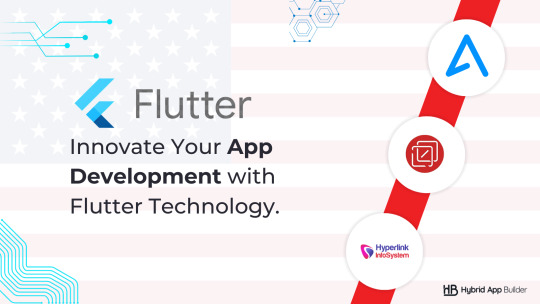
Innovate Your App Development with Flutter Technology https://www.hybridappbuilders.com/flutter-app-development-usa/
#mobile apps#app development#mobile app development#react native#development#flutter#apps#hybrid apps#innovation#xamarin
1 note
·
View note
Text

Flutter vs Xamarin vs React Native: Decoding the Best Framework for Your Mobile App
Explore the realm of mobile app development with in-depth knowledge about Flutter, Xamarin, and React Native. Uncover the framework that best suits your project.
#Hire Flutter Developer#mobile app development company#react native app development compan#Xamarin app development
0 notes
Text
Choosing between React Native and Xamarin for cross-platform development? This comprehensive analysis breaks down the strengths and weaknesses of each framework to help you make the best decision.
0 notes
Text

Navigating the Complex World of Mobile App Development
In today’s tech-driven world, mobile apps have become a cornerstone of how we connect, work, and play. Whether you’re launching a startup or enhancing an established business, building a mobile app can be a game-changing move. One of the most important decisions you’ll face is choosing the right technology stack. The tech stack you pick will directly influence your app’s performance, scalability, and overall user experience.
What Exactly Is a Tech Stack?
A tech stack is essentially the set of tools, programming languages, and frameworks you use to build your app. For mobile apps, the stack typically consists of three main components:
Front-End: This is what users see and interact with — the app’s interface.
Back-End: This is the engine under the hood — handling data storage, processing, and integrations.
Platform: The operating system your app is built for, like iOS, Android, or both.
Key Considerations When Picking a Tech Stack
Let’s dive into the options and what you should think about when deciding which tools to use.
Platform Options
Native Development
Languages:
iOS: Swift or Objective-C
Android: Kotlin or Java
Pros:
Best-in-class performance.
Full access to device features like cameras, sensors, and GPS.
Cons:
Higher costs.
Longer development time if building for both iOS and Android.
2. Cross-Platform Development
Frameworks:
React Native (JavaScript and React)
Flutter (Dart)
Xamarin (C#)
Pros:
Faster development.
Reusable code for both iOS and Android.
Generally lower costs.
Cons:
Slightly lower performance compared to native apps.
Limited access to some advanced native features.
3. Hybrid Development
Tools:
Ionic (HTML, CSS, JavaScript)
PhoneGap/Cordova (HTML, CSS, JavaScript)
Pros:
Easy to learn and work with if you’re familiar with web development.
Leverages standard web technologies.
Cons:
Performance is not as strong as native or well-optimized cross-platform apps.
User experience can feel less “native.”
How to Make the Best Choice for Your App
Your decision will depend on several factors. Here are some key points to consider:
App Complexity:
For simple apps, cross-platform frameworks like React Native or Flutter are great choices.
For feature-heavy or complex apps, native development might be the way to go.
Time to Market:
If you’re on a tight schedule, cross-platform tools can speed up the process.
Budget:
Native development can be pricey since you’ll likely need separate teams for iOS and Android.
Cross-platform and hybrid options are usually more cost-effective.
Performance Needs:
Native apps deliver the best performance, but modern cross-platform frameworks have come a long way and can handle most needs efficiently.
Team Expertise:
Leverage the skills your team already has. If they’re experienced in JavaScript, for example, React Native might be a natural fit.
Final Thoughts
Choosing the right tech stack is a pivotal step in mobile app development. It’s about finding the perfect balance between your project’s requirements, your budget, and your team’s expertise. By weighing factors like app complexity, performance, and cost, you can make a well-informed choice that sets your app up for success. Remember, a solid tech stack is the foundation of a scalable, user-friendly, and high-quality app.
#mobile app development#android development#ios development#hybrid app development#cross platform app development#technology#software development#programming
2 notes
·
View notes
Text
Cross-Platform App Development Services: Breaking Barriers and Expanding Reach

In today's digital era, mobile applications have become an integral part of our lives. Whether it's for social networking, e-commerce, or productivity, mobile apps have revolutionized the way we interact with technology. However, developing an app that can cater to the diverse needs of users across different platforms can be a daunting task for businesses. This is where cross-platform app development services come into play.
What is Cross-Platform App Development?
Cross-platform app development is the process of building mobile applications that can run on multiple operating systems, such as iOS and Android, using a single codebase. Unlike native app development, which requires separate codebases for each platform, cross-platform development allows businesses to save time, resources, and effort by creating a single app that works across various platforms.
The Advantages of Cross-Platform App Development:
1. Cost-Effectiveness: Developing separate apps for different platforms can be expensive. Cross-platform development enables businesses to significantly reduce costs by reusing a single codebase across multiple platforms. This approach also minimizes the need for hiring platform-specific developers, resulting in further cost savings.
2. Time Efficiency: Cross-platform frameworks and tools provide developers with the ability to write code once and deploy it on multiple platforms. This drastically reduces the time required for development, testing, and deployment, allowing businesses to bring their apps to market faster and gain a competitive edge.
3. Consistent User Experience: With cross-platform development, businesses can ensure a consistent user experience across different platforms. By using a single codebase, developers can maintain design and functionality consistency, resulting in a seamless experience for users, regardless of the device or operating system they use.
4. Wider Market Reach: By developing a cross-platform app, businesses can reach a broader audience as their application can run on various devices and operating systems. This expanded market reach enhances brand visibility and increases the potential user base, leading to greater customer acquisition and revenue generation.
5. Easy Maintenance: Updating and maintaining separate codebases for different platforms can be challenging. Cross-platform development simplifies the maintenance process as changes and updates can be applied to a single codebase, ensuring consistency and reducing the chances of introducing bugs or inconsistencies across platforms.
Choosing the Right Cross-Platform Development Framework:
When it comes to cross-platform app development, there are several frameworks available, each with its unique features and capabilities. The choice of framework depends on various factors such as project requirements, target audience, performance needs, and developer expertise. Some popular cross-platform frameworks include React Native, Flutter, Xamarin, and Ionic.
Partnering with Cross-Platform App Development Services:
While cross-platform app development offers numerous benefits, it requires technical expertise and experience to leverage the full potential of these frameworks. This is where partnering with cross-platform app development services can make a significant difference.
Professional app development services specializing in cross-platform development have the necessary skills, knowledge, and resources to create high-quality, feature-rich applications that can run seamlessly across multiple platforms. These services understand the intricacies of various frameworks, ensuring optimal performance and user experience.
Additionally, cross-platform app development services keep up with the latest industry trends and advancements, allowing businesses to incorporate cutting-edge features and technologies into their applications. They also provide ongoing support, maintenance, and updates, ensuring that the app remains up-to-date and compatible with the latest devices and operating system versions.
Conclusion:
Cross-platform app development services have emerged as a game-changer for businesses looking to develop mobile applications that can reach a wider audience while optimizing costs and development time. By leveraging the benefits of cross-platform development, businesses can break barriers, expand their reach, and deliver engaging experiences to users across multiple platforms.
Whether you are a startup or an established enterprise, partnering with cross-platform app development services can unlock new opportunities and drive your business forward in the ever-evolving mobile landscape.
Source
#AppDevelopment#WebDevelopment#MobileApps#WebApps#SoftwareDevelopment#UIUXDesign#MobileDevelopment#WebDesign#CodeLife#TechSolutions#AppDesign#MobileTech#WebDev#DigitalTransformation#ResponsiveDesign#Innovation#TechIndustry#AppSolutions#WebSolutions#CodeNerds
23 notes
·
View notes
Text

Unlock the Potential of React Native
Ready to upgrade your Xamarin app? React Native is a powerful framework that delivers superior performance and a more engaging user experience. By transitioning to React Native, you can take advantage of the latest mobile development technologies and ensure your app stays competitive in the market. Our skilled developers specialize in making this transition smooth and hassle-free.
Reach out to us now and let's discuss how we can transform your app!
#ConnectInfosoft#ReactNative#XamarinUpgrade#MobileDevelopment#AppTransition#SuperiorPerformance#UserExperience#TechInnovation#MobileTech#AppDevelopment#ReactNativeDevelopers#TechUpgrade#ModernApps#MobileFramework#SeamlessTransition#CompetitiveEdge#FutureOfApps#TechTrends#AppEvolution#MobileSolutions#DevelopersCommunity#InnovationInTech#AppEnhancement#TechAdvancement#MobileInnovation#CodingLife#ReactNativeApp#SmoothTransition#HassleFreeDevelopment#AppSuccess
2 notes
·
View notes
Text
Contract Hiring Mobile App Developers in 2024-25
In this digitally dependent world, one of the fastest-growing technologies is the introduction of mobile apps for brands. Businesses utilize apps to drive creation, quick access to information, customer communication, and engagement with the brand.
The growth rate of mobile-based applications is expected to be 14.3% from the year 2024 to 2030 – Grand View Research
This makes mobile app developers one of the most in-demand skills in the market. For a successful project, the presence of skilled professionals is essential and businesses are also inclined to hire app developers remotely. Read the complete guide and let’s reveal how contract hiring mobile app developers is beneficial for businesses.
Why is Contract Hiring Beneficial?
When to Hire Mobile App Developers on Contract and Not on Employment?
Identifying the Technology & Scope of Work for the Mobile App Project
Sources of Contract Hiring
Interviewing and Screening Candidates
Ideal Terms & Clauses for Contract Hiring
Setting up effective Remote Communication and Collaboration
Conclusion
Why is Contract Hiring Beneficial?
Contract work also commonly known as the gig economy is highly popular in the market. Businesses can easily fill the temporary skill gap in the company by indulging with contract workers on project to project basis.
However, the key aspect is that businesses should know when to opt. to hire remote app developers on a contract basis.
When to Hire Mobile App Developers on Contract and Not on Employment?
Project & Talent wise need only
If your project needs short-term assistance from a developer it’s best to hire contractors. And, if the requirements increase, you can scale up the work with the hired professional.
Cost Considerations
Organizations easily save money and resources by opting for contract developers instead of permanent employees. If you’ve tight budgets and short-term requirements, this would be the best option.
Requirement of a Specialized Skill
Contract developers are often specialized in one specific skill like React Native or Swift. When the project is dependent on one skill that you do not have in-house, then you can hire a professional from a pool of Talents who best fits your requirements.
Identifying the Technology & Scope of Work for the Mobile App Project
Before you start hiring mobile app developers, it’s critical to understand the scope of the app and project requirements in detail.
Understand the Problem the App solves and for whom
Perform market research to identify the need for an app among your target audience. Plan how the app is going to benefit the users and what is a list of problems that need to be solved via developing the app. The classic example could be the problem of consumer interaction. With the app’s introduction, a brand can promote more engagement and interaction with the target audience.
Understand the project requirements and related core features
Discuss with decision-makers what features the app must have for the users (the core feature and the differentiable features). Decide on the platforms the App will support (android, iOS, or both). You must also finalize project details beforehand like deliverables and deadlines.
Choose the right Technology Stack
Selecting the right technology stack sets the correct foundation for the app. Consider the purpose of the app while keeping the target audience in mind and select either a native or cross-platform stack.
1. Native Mobile App Development ensures optimal performance and ‘platform-specific’ capabilities.
iOS: Swift or Objective-C for programming, Xcode for development, UIKit for interface design.
Android: Kotlin or Java for programming, Android Studio for development, Android SDK for interface design.
2. Cross-Platform Mobile App Development ensures quick deployments, reusability of codes, and coverage of both platforms (Android & iOS).
React Native, Flutter, or Xamarin Frameworks offer the ability to write code once and deploy it across multiple platforms.
3. Other Tools, Libraries, and Databases to be identified might include Android Studio, Xcode, Firebase, Restful, SQLite, Room DB, SQL, MongoDB, Redux, etc.
Outline the Scope of Work & Document in detail
A well-defined scope of work sets the wheels in motion for an app development project. The clear SOW acts as a roadmap for the developer and client and reduces any chances of misunderstanding in the process.
Also well document the Team requirements, their roles & responsibilities, features & functionalities, tasks & deliverables, milestones & deadlines, expectations for UI/UX designs, testing guidelines, deployment & maintenance guidelines, etc.
Sources of Contract Hiring
Here are a bunch of options that one can select from to hire mobile app developers in 2024.
Leveraging Specialized Platforms,
There are freelance platforms available in the market like Upwork, and Fiverr, that have professional freelancers who can provide you with one-time developer services.
IT Agencies (B2B contract Hiring)
Consider hiring IT agencies like Sprybit that have a pool of talent who are not only pre-screened but also reliable for the project.
Networks
Ask in your Network, post on Facebook – LinkedIN – Reddit groups, reach out to Industry people, and ask for references.
Interviewing and Screening Candidates
Following a pre-decided screening process is essential to finding the right talent for your organization.
Review Past Work/Portfolio
Make sure to review the candidate’s portfolio related to the mobile development projects. Examine the projects that require similar skill sets as compared to your project and judge their proficiency. You can also inquire about those projects and codes to understand their level of knowledge.
Consider requesting some sample codes. The GutHub links can act as an excellent proof of skills. This step is necessary to make a calculated decision.
Screening of Technical Skill
Shortlisted candidates must be proficient in technical skills according to the project requirements. Hiring managers must conduct the right assessment that ensures the presence of skill expertise.
These assessments must be practical and should involve coding for varied purposes. With this, you can understand data structures and algorithm knowledge in the candidate.
Identify other important factors
Apart from technical skills, other non-technical factors are essential to be considered during the hiring process. Check the candidate’s communication skills to ensure they will be able to communicate their ideas and plans with other team members. Candidates must also possess problem-solving skills to navigate technical errors in codes if required.
There are multiple design principles for mobile apps to enhance user experience. Check if the app developer is aware of such technicalities to select the best possible resource for your project.
Ideal Terms & Clauses for Contract Hiring
Whether you are a newbie or an experienced professional; while contract hiring mobile app developers; the ideal terms to keep your data, time, money & idea safe remain an unmissable necessity.
Hiring from a Freelance Portal does check many boxes with their well-established policies and processes; which might be good but not always foolproof. Hiring freelancers directly or from IT Agencies engages us in co-building Terms & Conditions on mutual consensus or are pre-defined with our experience as a Vendor Compliance Policy. But, all-in-all, making sure that every safety measure for our Project is taken care of remains our sole responsibility.
Payment Terms
Unlike full-time employees, one can’t pay to contract professionals every month. Select among a wide range of options like hourly-rate, and project-basis. Transparency from the very beginning will help smooth project completion.
IP rights
Before starting the collaboration, clarity on IP i.e. intellectual property is essential. As in who is the owner of code, design, app interface, etc should be agreed on to avoid disputes in the future.
Confidential & Non-disclosure agreements
Once you allot work to these contract workers, you will be sharing confidential details of the company. Make an advance agreement and ask them to sign it before commencing the work.
Project Timeline & Quality Assurance Standards
Maintain the quality of the project by deciding in prior about project deadlines, submissions, and code quality in terms of programming languages.
Termination clause
State a prescribed reason for when can either of the parties end the agreement. This brings clarity to the table regarding moral, ethical and professional expectations your Organization has.
Dispute Resolution
In rare cases, the client and candidate might go into a dispute that needs to be solved for the project’s betterment. Laying out steps to clear disputes and solve them will act as guidance in case it’s required.
Indemnity & Liability
It is important to outline the obligations & responsibilities of each party during any case of losses, damages and/or legal claims arising during the course of the project.
Governing Law & Governing Body
Involving government laws, rights, and bodies can help in resolving disputes and save the project’s future. This way both parties can come to the same conclusion under legal principles.
Setting up effective Remote Communication and Collaboration
Remote work culture creates room for misunderstanding and unclear targets. However, the issue can be tackled if there’s a pre-decided communication system planned. From work allotment to final project submission, an effective communication plan benefits all the parties involved in the project.
These can be achieved by establishing communication, collaboration & project management tools for your Project:
Inbuilt communication channels of Freelance Platforms
Slack
Microsoft Teams
Zoom
Google Meet
Jira
Asana
Trello
Basecamp
Google Workspace
Dropbox
Microsoft 365
Notion
Conclusion
Organizations’ idea to hire mobile app developers on Contract is spreading like a forest fire. Businesses now have access to partner freelancers and contract workers for short periods with ideal skills, and reliable talent.
Before starting your journey on the same path, make sure to remain transparent and pre-decide the essential factors like payment, timelines, IP & communication; and finally proceed to give life to your mobile app.
#hire remote developers#hire developers#hire mobile app developers#android app developers#ios app developers#contract hire developers#hire developers on contract#remote developers for hire#hire dedicate remote developers#hire pre vetted remote developers
2 notes
·
View notes
Text
Top Mobile App Development Frameworks in 2023 - Lode Emmanuel Palle
As of my last knowledge update in September 2021, I can provide information about some of the popular mobile app development frameworks up to that point. However, please note that the landscape of technology can change rapidly, and new frameworks may have emerged or gained popularity since then. Here are some of the well-known mobile app development frameworks mentioned by Lode Emmanuel Palle that were popular up to 2021:
React Native: Developed by Facebook, React Native is a widely used open-source framework for building cross-platform mobile apps. It allows developers to use JavaScript to create native-like user interfaces for both iOS and Android.
Flutter: Created by Google, Flutter is another popular open-source framework for building cross-platform apps. It uses the Dart programming language and provides a rich set of customizable widgets, enabling high-quality and performant user interfaces.
Xamarin: Owned by Microsoft, Xamarin allows developers to build native apps for iOS, Android, and Windows using a single codebase in C#. It provides a way to share a significant portion of code across platforms while still delivering native user experiences.
Ionic: Built on top of Angular and using web technologies like HTML, CSS, and JavaScript/TypeScript, Ionic is a framework for building cross-platform mobile apps with a native-like feel. It also provides a suite of UI components.
Vue Native: Based on Vue.js, Vue Native lets developers build mobile apps using Vue's declarative syntax. It's designed to be similar to React Native, making it easy for developers familiar with Vue.js to transition to mobile development.
PhoneGap / Apache Cordova: PhoneGap is an open-source framework that uses web technologies to build mobile apps that can run on various platforms. It leverages Apache Cordova to access native device features.
SwiftUI (for iOS): Introduced by Apple, SwiftUI is a framework for building user interfaces across all Apple platforms using Swift programming language. It's mainly focused on iOS, macOS, watchOS, and tvOS app development.
Kotlin Multiplatform Mobile (KMM): Developed by JetBrains, KMM is a relatively new framework that aims to allow developers to share code between Android and iOS apps using Kotlin. It's designed for more seamless cross-platform development.
NativeScript: NativeScript enables building native apps using JavaScript, TypeScript, or Angular. It provides access to native APIs and components, offering a truly native experience.
According to Lode Emmanuel Palle. the choice of a mobile app development framework depends on various factors including your familiarity with the programming language, the complexity of the app, the desired platform(s), and the specific features you need. It's always a good idea to research and stay updated on the latest developments in the field to make informed decisions.
9 notes
·
View notes
Text
PWA vs Native, Hybrid, SPA, MP: A Complete App Development Guide
In today's digital age, having a mobile app for your business is essential to stay ahead of the competition and cater to the growing needs of mobile users. However, when it comes to an app development company, there are several options to consider; one of them is Nivida Web Solutions Private Limited. Among the various approaches available, Progressive Web Apps (PWAs), Native apps, Hybrid apps, Single-Page Applications (SPAs), and Multi-Platform apps (MP) are the most popular choices. Each of these options has its own strengths and weaknesses. In this comprehensive app development guide, we will compare and contrast these different approaches to help you make an informed decision.
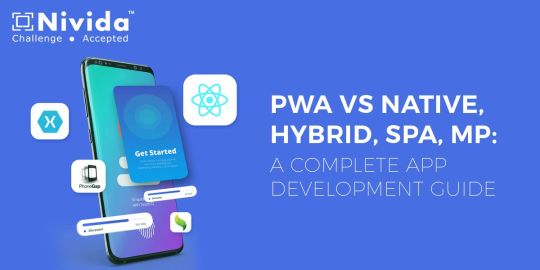
Progressive Web Apps (PWAs):
PWAs are web applications that are designed to look and function like native mobile apps. They are built using web technologies such as HTML, CSS, and JavaScript and are accessible through a web browser. PWAs are highly responsive, installable, and can work offline, making them an excellent choice for businesses looking to reach a wider audience across multiple platforms. Additionally, PWAs can be easily updated without requiring users to download new versions.
Native Apps:
Native apps are developed for specific platforms like iOS or Android using platform-specific languages (Swift or Objective-C for iOS, Java or Kotlin for Android). They offer the best performance, user experience, and access to device-specific features like camera, GPS, and push notifications. However, developing native apps requires separate codebases for different platforms, resulting in higher development costs and longer development cycles.
Hybrid Apps:
Hybrid apps are a combination of web and native apps. They are built using web technologies like HTML, CSS, and JavaScript and are wrapped in a native shell that enables them to be distributed through app stores. Hybrid apps provide a balance between cost-effectiveness and access to native features. However, they may not deliver the same performance as native apps, and certain device-specific functionalities might be limited.
Single-Page Applications (SPAs):
SPAs are web applications that load a single HTML page and dynamically update the content as users interact with the app. They offer a seamless user experience similar to native apps and can be accessed through web browsers. SPAs are easier to develop and maintain compared to native apps, but they may not provide the same level of performance and access to device features.
Multi-Platform Apps (MP):
Multi-platform apps are developed using cross-platform frameworks like React Native, Flutter, or Xamarin. These frameworks allow developers to write code once and deploy it across multiple platforms, saving time and effort. Multi-platform apps can achieve near-native performance and provide access to device features, making them a popular choice for businesses targeting multiple platforms.
When considering app development companies in India or Gujarat, it's essential to find a partner that understands your specific requirements and has expertise in the chosen development approach. Android App development companies in India and Gujarat offer a wide range of services, including native app development, hybrid app development, and PWA development. Similarly, Mobile App development companies in India and Gujarat can provide expertise in developing SPAs and MP apps.
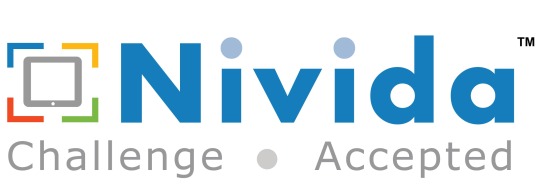
Before choosing an app development approach, consider factors such as budget, target audience, performance requirements, and time-to-market. Each approach has its own pros and cons, and the decision should align with your business goals and objectives. Consulting with a reputable app development company, Nivida Web Solutions Private Limited can help you navigate through these choices and make the right decision for your business.
In conclusion, the choice between PWAs, Native apps, Hybrid apps, SPAs, and MP apps depends on various factors such as performance, cost, development time, and target audience. Each approach has its own merits, and it's important to evaluate them based on your specific needs when selecting an app development company in India.
#eCommerce development company in India#eCommerce development Companies in Gujarat#Mobile App development Companies in India#Mobile App development company in Gujarat#Android App development Companies in India#Android App development company in Gujarat#Digital Marketing company in India
6 notes
·
View notes
Text
Discover the future today! Dive into our blog exploring the fascinating intersection of AI and custom app development.
#mobile apps#app development#mobile app development#react native#development#flutter#apps#hybrid apps#innovation#xamarin#ai revolution#ai#ai generated
1 note
·
View note
Text
World-Class Mobile App Development for a Global Audience

In today’s hyper-connected digital economy, mobile apps are no longer optional—they’re essential. Whether it’s for eCommerce, healthcare, logistics, or finance, mobile applications are redefining how businesses operate and how customers engage. The demand for high-quality mobile app development services is growing rapidly, driven by the need to reach diverse audiences across multiple countries and platforms. Organizations looking to make a real impact must now think globally while executing locally, ensuring their apps are not just functional but also tailored for a wide range of users across different cultures and regions.
The Need for Global-Ready Apps
The digital marketplace is vast, and the most successful mobile apps are those that transcend borders. This requires more than just language translation. Global-ready mobile applications must be designed with cultural relevance, regulatory compliance, performance optimization, and accessibility in mind. From payment gateway integrations specific to local markets to UI/UX elements that reflect regional user behavior, going global with your app means making it feel local to every user, wherever they are.
Creating such experiences demands a development process that is deeply rooted in research, strategy, and modern technology. Businesses must work with teams that understand the nuances of international markets and can adapt their approach to deliver personalized, high-performing mobile solutions.
Cross-Platform Compatibility
With a global audience comes platform diversity. Users may access your app through Android in one country and iOS in another. This makes cross-platform compatibility a critical component of any mobile development strategy. Technologies like Flutter, React Native, and Xamarin enable developers to build apps that work seamlessly across multiple devices without compromising performance or user experience.
By choosing the right tech stack and development framework, businesses can significantly reduce time-to-market, maintain consistent branding, and ensure that updates and features roll out simultaneously across all platforms.
Localized User Experience
Localization is far more than just converting text into another language. It involves adapting the app’s content, design, and functionality to align with the cultural expectations of users in each target market. From layout preferences to color symbolism, every detail matters. For instance, a design that works well in Western markets may not resonate with users in Asia or the Middle East.
Smart localization enhances user engagement and boosts app adoption rates. It’s an investment in user satisfaction and brand loyalty, making your app more accessible and relatable to a broader audience.
Security and Compliance Across Borders
When launching a mobile app globally, data privacy and legal compliance are not optional. Different regions have different regulations—such as GDPR in Europe, HIPAA in the United States, and PDPA in Asia-Pacific countries. A world-class mobile app must be designed with data protection, user consent, and secure data storage in mind from the very beginning.
Security features like two-factor authentication, end-to-end encryption, and regular vulnerability assessments are vital. They not only protect your users but also establish trust in your brand across international markets.
Agile and Scalable Development
To stay competitive in the global app landscape, development must be agile and scalable. Agile methodologies enable faster iterations, quicker feedback loops, and adaptive planning. This approach is especially important when launching in multiple regions, as it allows teams to respond rapidly to user feedback and market changes.
Moreover, scalability is crucial. Your app should be built on an architecture that can handle increasing traffic, new features, and integration with third-party systems without degrading performance.
Data-Driven Decision Making
Analytics play a pivotal role in optimizing mobile apps for global users. From usage patterns to feature adoption rates, real-time data helps businesses understand what’s working and what’s not in each region. Armed with this knowledge, teams can refine user flows, improve retention, and boost conversions.
Personalized recommendations, behavioral targeting, and A/B testing can all be driven by data, helping businesses deliver more value to users in every corner of the world.
Partnering with the Right Experts
Launching a successful app on a global scale requires the right strategic and technical partners. A world-class mobile app development company brings not only coding expertise but also a deep understanding of international markets, scalable architecture, and end-user psychology. From ideation to post-launch support, having a skilled and experienced team ensures your app stands out in a crowded global marketplace.
By choosing a partner that aligns with your business goals and understands the nuances of global app deployment, you set the stage for sustainable growth and long-term success.
#mobile app development company#software development company#mobile application development company#mobile application development services
0 notes
Text
The Future of Cross-Platform App Development
In recent years, cross-platform app development has gained significant traction among businesses aiming to reach wider audiences while optimizing development costs.
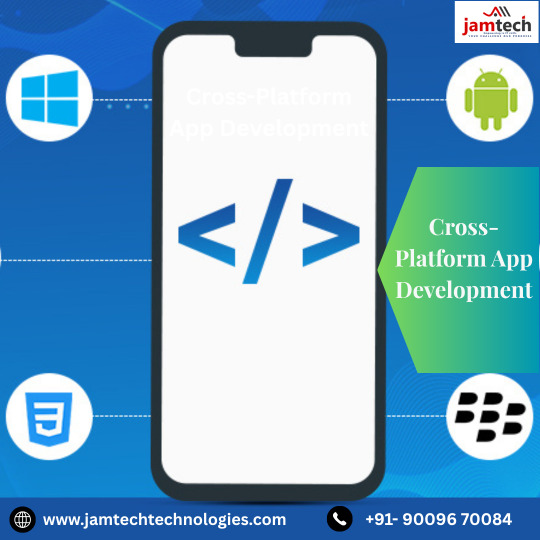
With rapid technological advancements, the future of cross-platform app development is set to transform how developers build, deploy, and maintain mobile and web applications. This article explores the evolving landscape, key trends, and the long-term benefits of adopting cross-platform development strategies.
Understanding Cross-Platform App Development
Cross-platform app development refers to the process of building applications that can run on multiple operating systems (primarily Android and iOS) using a single codebase. This approach contrasts with native app development, where separate codebases are required for each platform.
Popular cross-platform frameworks include Flutter, React Native, Xamarin, and Ionic. These tools enable developers to write one set of code and deploy it across multiple platforms, improving efficiency and reducing time-to-market.
Key Trends Shaping the Future
Improved Framework Capabilities Tools like Flutter and React Native continue to evolve, offering near-native performance, extensive UI capabilities, and support for web and desktop applications. This convergence of technologies is making cross-platform development more versatile and powerful.
Integration of AI and Machine Learning Integrating AI-powered features into cross-platform apps is becoming more accessible. Developers can now implement functionalities such as voice recognition, predictive text, and recommendation engines across platforms using common APIs and frameworks.
Increased Adoption of Low-Code/No-Code Platforms Businesses are leveraging low-code tools for mobile app development that support cross-platform capabilities. These platforms empower non-developers to participate in app creation, further accelerating digital transformation.
Focus on Performance Optimization Historically, cross-platform apps were criticized for their limited performance compared to native apps. However, new architectural improvements, such as Flutter’s Dart-based rendering and React Native’s new Fabric architecture, are closing this gap.
Cloud Integration and Backend-as-a-Service (BaaS) Cross-platform developers are increasingly utilizing cloud services and BaaS solutions like Firebase, AWS Amplify, and Azure Mobile Apps to simplify backend management and enhance scalability across platforms.
Benefits of Cross-Platform App Development
Faster Development Time: A shared codebase accelerates development cycles and reduces duplication of effort.
Cost Efficiency: Businesses save on development and maintenance costs by hiring a single team for all platforms.
Wider Reach: Applications can simultaneously target users on iOS, Android, web, and desktop platforms.
Unified User Experience: Cross-platform frameworks support consistent UI design and functionality across devices.
Challenges to Consider
Despite its advantages, cross-platform mobile app development faces challenges such as:
Limited access to some native APIs and features.
Potential performance trade-offs in highly complex or graphics-intensive applications.
Framework learning curves and dependency on community support.
Conclusion
The future of cross-platform app development looks promising, with continuous innovation in frameworks, tools, and practices. Businesses and developers should consider cross-platform strategies to improve development efficiency, reduce costs, and reach broader audiences. As cross-platform development frameworks become more robust, the line between native and cross-platform apps will continue to blur, making this approach increasingly viable for all types of projects.
#CrossPlatformDevelopment#AppDevelopment#MobileAppDevelopment#FlutterDevelopment#ReactNative#HybridAppDevelopment#SoftwareDevelopment#TechInnovation#FutureOfApps#DevCommunity
0 notes
Text
How Can Companies Optimize ROI by Converting Android Apps to iOS (or Vice Versa)?
Optimize ROI by Converting Android Apps to iOS
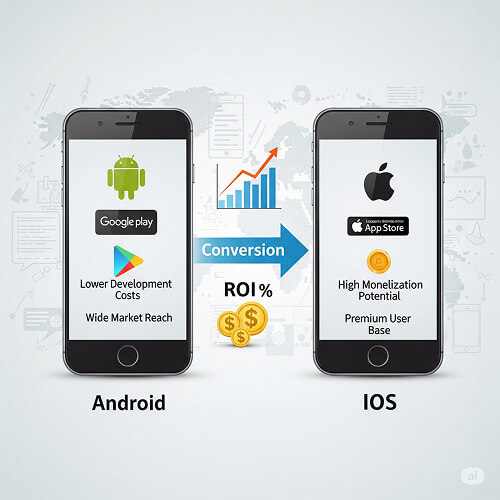
Introduction
In today’s mobile-first landscape, companies aiming to maximize their mobile app ROI must consider platform expansion. With Android dominating in user volume and iOS leading in revenue generation, converting your app from Android to iOS (or vice versa) can be a strategic move to reach a broader audience and boost profitability. This blog explores how app conversion can be a growth catalyst, helping businesses lower acquisition costs and increase user engagement across platforms.
Understanding Android to iOS App Conversion (or Vice Versa)
App conversion refers to the process of adapting an existing mobile application to operate on a different platform. Whether moving from Android to iOS or the reverse, this process involves more than just copying code. It includes reworking the UI/UX, adapting to platform-specific APIs, and ensuring functional parity across devices. Successful app conversion demands expertise in both Android and iOS app development to maintain performance and user satisfaction.
Top Reasons to Convert Android Apps to iOS (or Vice Versa)
Reach a wider audience: Tap into new user segments by expanding your presence to another platform.
Increase revenue potential: iOS users typically have higher lifetime value, while Android's larger user base can fuel ad-driven revenue models.
Improve brand presence: Being available on both platforms builds credibility and trust with users.
Maximize previous investments: Reusing assets and backend systems speeds up time-to-market and reduces development costs.
How App Conversion Improves ROI
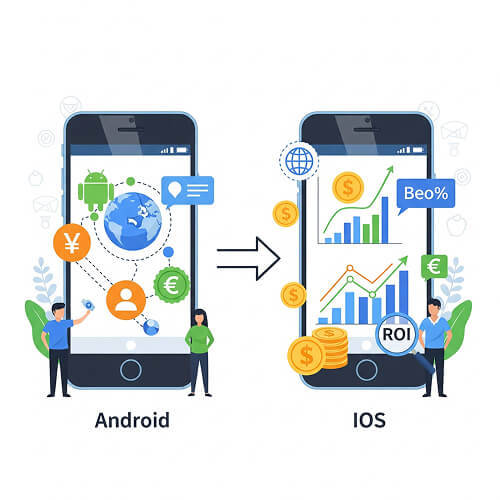
Converting your app allows you to scale without starting from scratch, which significantly lowers development costs. The ability to reach more users boosts installs, engagement, and revenue. Moreover, a cross-platform presence strengthens brand authority and opens doors to new monetization opportunities, like in-app purchases or subscriptions, ultimately maximizing return on investment.
Key Challenges in Mobile App Platform Conversion
UI/UX differences: iOS and Android have distinct design languages (Material vs. Human Interface Guidelines).
Technical variations: Differences in programming languages (Java/Kotlin for Android vs. Swift/Objective-C for iOS).
Third-party integration compatibility: Not all libraries and SDKs work identically across platforms.
Testing requirements: Each platform has its own device ecosystem and app store policies.
Steps to Successfully Convert Your Mobile App
Audit existing app code and features
Choose the right development approach (native or cross-platform)
Redesign UI/UX to fit the new platform standards
Adapt backend APIs and third-party services
Test extensively across devices and OS versions
Deploy to the relevant app store with optimized listings
Tools & Technologies for App Conversion
Flutter: Ideal for creating a single codebase for both platforms
Kotlin Multiplatform: Enables code sharing between Android and iOS
React Native: Popular framework for cross-platform mobile development
Xamarin: Microsoft-backed tool for .NET-based apps
Choosing the right tech stack depends on performance needs, UI complexity, and existing code structure.
Cost Estimation & ROI Forecasting

App conversion is typically more cost-effective than building a new app from scratch. Factors affecting cost include app complexity, UI redesign, and backend changes. Companies should calculate potential ROI by comparing conversion cost with projected increase in user acquisition, engagement, and revenue across the new platform.
Case Studies: App Conversion Success Stories
Example 1: A retail app that expanded from iOS to Android and saw a 40% increase in monthly active users
Example 2: A SaaS product that moved from Android to iOS, leading to a 30% boost in in-app purchases These examples showcase how strategic app conversion can result in measurable growth.
Tips to Maximize ROI After Converting Your App
Invest in App Store Optimization (ASO) for visibility
Launch targeted marketing campaigns on the new platform
Monitor analytics closely to track engagement and retention
Solicit user feedback to continuously refine the app experience
Conclusion
Converting your Android app to iOS or vice versa is not just a technical decision—it's a business strategy. When done right, it can significantly enhance user reach, reduce development overhead, and boost ROI. By partnering with an experienced app development company like CQLsys Technologies, you can ensure a smooth transition and unlock new growth opportunities across platforms.
#AppMigration#MobileStrategy#AppMarketing#TechROI#DigitalGrowth#AppScaling#iOSDeveloper#AndroidDeveloper#MobileSolutions#BusinessTech#UserEngagement#RevenueGrowth#AppUpgrade#TechTips#CQLsysTech#Innovation
0 notes
Text
Top Mobile App Development Platforms for Modern Businesses

Discover the best mobile app development platforms to streamline your app creation process and reach users on both Android and iOS. This guide from Atharva System explores top tools like Flutter, React Native, Xamarin, and more—each offering unique strengths in performance, flexibility, and cross-platform capabilities. Whether you're a startup or enterprise, choosing the right platform is crucial to delivering a fast, secure, and engaging mobile experience. Learn how to make informed decisions based on your business goals, development needs, and budget. Stay ahead with the latest trends in mobile app development platforms.
#Android App Development Company#Android App Development Service#Android Application Development Company#React Native App Development#React Native App Development Company#React Native Development Company#React Native App Development Services#React Native Development Services
0 notes